Marriage group files ethics complaints against Alabama Supreme Court Justice Mike Bolin
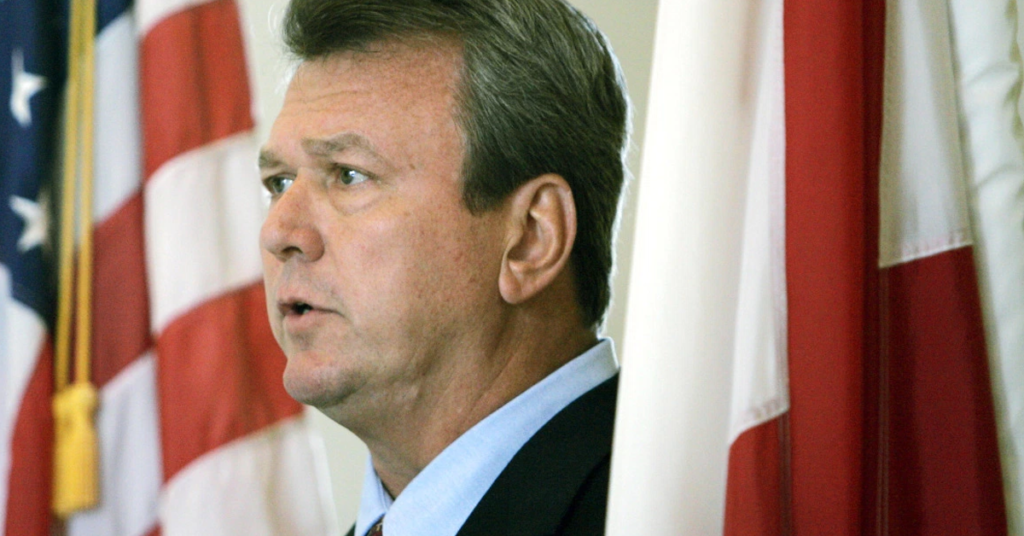
Adding to their ever-growing lists of complaints against Alabama Supreme Court justices, the Sanctity of Marriage Alabama (SOMA) filed an ethics complaint against Justice Michael “Mike” Bolin. SOMA, the same group that filed complaints against suspended Chief Justice Roy Moore and Acting Chief Justice Lyn Stuart, filed the complaint Monday with the Alabama Judicial Inquiry Commission (JIC) saying Bolin blatantly disregarded the Canons of Judicial Ethics by failing to disqualify himself from proceedings in Moore’s case. The group also says all Alabama voters should write-in an honorable attorney instead of Bolin at the polls on Tuesday. “Justice Bolin has recently recused himself from Moore’s appeal,” said Tom Ford, spokesman for Sanctity of Marriage Alabama, “however, he failed to do so in May of 2016 where his impartiality was equally questionable. Why the attempt to save face now? No Alabamian can expect a fair trial at the Alabama Supreme Court with acting Chief Justice Lyn Stuart and Mike Bolin heading the group.” In March of 2016, Justice Bolin joined a portion of Justice Greg Shaw’s opinion condemning Chief Justice Moore’s stance in a gay marriage case, the group explains. Later that opinion was used by the JIC in an effort to oust Moore. “That opinion was used by the Judicial Inquiry Commission and radical leftists in their crusade to oust Chief Justice Moore,” according to SOMA’s press release. In May 2016, Justice Bolin failed to disqualify himself from the ethics proceedings against Moore, but in Sept. 2016 suddenly recused himself from hearing Moore’s appeal. “Perhaps to save face,” the group surmises. “Justice Bolin does not deserve the vote of the people of Alabama on Tuesday,” Ford continued. “Conservative voters have been betrayed ever since the day Justice Bolin gave Alabamians and conservatives the cold shoulder by joining the Southern Poverty Law Center in condemning Chief Justice Moore for legally defending the conservative platform. Love or hate Chief Justice Moore, all voters of all parties should be outraged by Justice Bolin’s unethical and political handling of the case.” Ford concluded, “As Justice Bolin is unchallenged on Tuesday, we urge all Alabamians to refuse to give Justice Bolin your vote and write-in an honorable Alabama attorney for Associate Justice of the Supreme Court Place No. 1.” Alabama Today’s efforts to reach Bolin for comment were unsuccessful.
Analysis: Winner must help heal wound in American politics
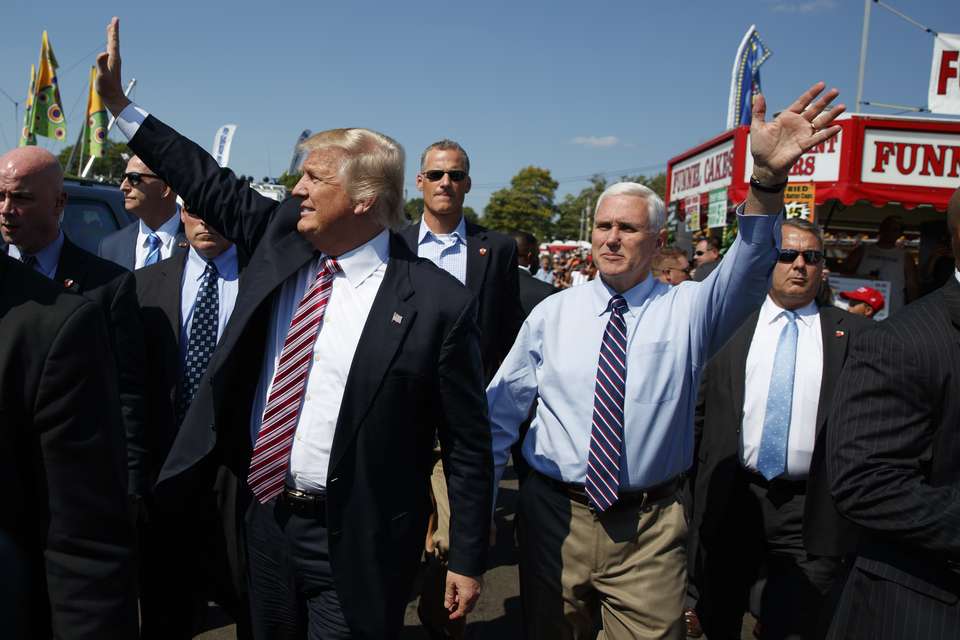
We’ll know soon enough who won. We already know the prize: A big, ugly wound in the heart of American politics. Nearly two years of relentless campaigning and racially loaded rhetoric has exposed a country that is deeply fractured along lines that are hardening and raw. Race, gender and class appear to be ever more reliable predictors of whether Americans cast their ballots for Donald Trump or Hillary Clinton. And as Americans have retreated further into their corners, politicians have seen little motivation to understand the other side. The dynamic just played out, while America (and the world) cringed. This campaign often looked like a noisy and incoherent conversation taking place in parallel worlds, with Donald Trump and Hillary Clinton shouting across a daunting gulf between them. It may have been a race filled with unpredictable moments, but its near certainties are just as notable. As she heads into Election Day, Clinton is on track to win solid, and in some cases overwhelming majorities, of black, Hispanic and college-educated voters. Polls show Clinton, running to be the first female president, may also hit new levels of support among women. Trump, meanwhile, has been propelled by support from white, working-class voters, a group that according to polls may reject Clinton more decisively than any of her recent Democratic predecessors. These splits between whites and minorities, between men and women, between those with college degrees and those without, did not begin in 2016. Clinton’s coalition is likely to look much like the one President Barack Obama assembled in 2008 and 2012, and has its roots much deeper. But 2016 will be the year when the gaps widened, the lines hardened and the conversation, in turn, became more painful. It will be remembered as the time when a Republican candidate could call American cities “warzones” without apparent worry about the feelings of the people who call them home. It will be remembered as the election in which Clinton described half of Trump’s supporters as a “basket of deplorables,” and apologized only for her measurement. It will be remembered as a moment when Trump’s closing argument was that “everything’s wrong,” while Clinton asked “since when do we become pessimistic?” It’s hard not to blame Trump’s button-pushing candidacy for much of this strangeness. The Republican nominee’s bid made a mockery of party elders’ “autopsy” of the 2012 defeat of Mitt Romney, which bemoaned that the GOP “offends too many people unnecessarily.” But the party’s base nominated a man who questioned the legitimacy of the first black president. They chose a candidate who declared that Mexico was sending “rapists” across the border. They chose a 70-year-old reality-TV star who spent years making sexist remarks. The interviews should have given hints about Trump’s attitudes toward women, even before the tape in which he brags about grabbing women’s genitals. Trump’s fate now rests in the hands of the very people he’s offended. If blacks, Hispanics, young people and women turn out in large numbers, it becomes exceedingly difficult to find enough of his voters to win the day. Roughly 45 percent of the electorate are non-college educated white, the core of Trump’s base, noted Brookings Institution demographer William Frey. And that share is shrinking. They made up 50 percent in 2008, he said, and 57 percent in 2000. But Trump’s willingness to risk saying the thing others would not has no doubt connected with a substantial share of America’s voters. The New York businessman saw the opportunity to run against his party and those wanting to restore America to a lost moment. “I watch the speeches of these people, and they say the sun will rise, the moon will set, all sorts of wonderful things will happen. And people are saying, “What’s going on? I just want a job. Just get me a job. I don’t need the rhetoric. I want a job,” he said from the lobby of his Trump Tower high rise, when he announced his campaign. If Trump wins, it will be because he understood the depths of white anxiety. It will be because he galvanized the alienated and the angry, in corners of the country where people have felt ignored through eight years of the Obama administration. Democrats acknowledge they may have left Trump this opening. For much of her campaign, Clinton had all but given up talking to white, working class men. That was for surrogates like her husband, Bill Clinton, Vice President Joe Biden, both masters of communicating to “Bubba” voters – and even Obama. On Monday, Clinton began to acknowledge the work she had ahead of her. “Anger is not a plan, my friends,” she said. “If we’re going to harness our energy and try to overcome our problems, then we need to start talking to each other again.” Republished with permission of the Associated Press.
Watching Tuesday: America does the wave, east coast to west
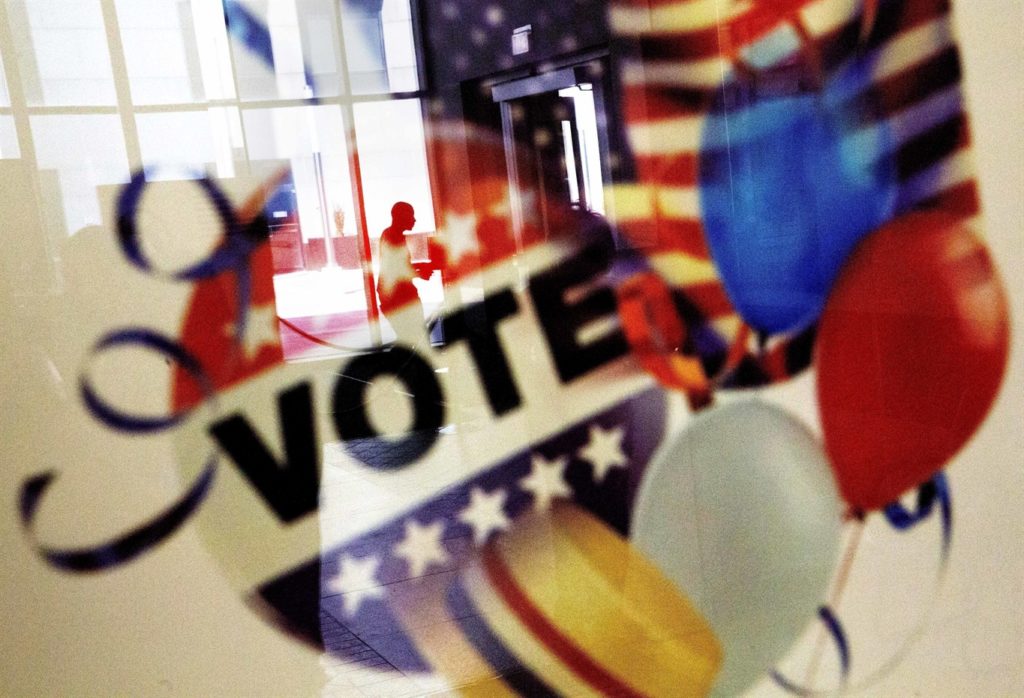
Grab some snacks, the TV remote, your calculator and a schedule of poll closings. You might also want to caffeinate because it could be a late night. The tumult and tedium of Campaign 2016 finally culminates Tuesday as the nation chooses among Hillary Clinton, Donald Trump and a variety of third-party types. The action will roll from east coast to west, from pre-dawn voting in New Hampshire to late-night poll closes in Alaska. Some things to watch for as the autumn of our campaign discontent hurtles to a close (all times are EST): THE TIMELINE Look for the first burst of results when polls close at 7 p.m. in Georgia, Indiana, Kentucky, South Carolina, Vermont and Virginia. Look for bigger blasts of numbers just after 8 p.m. and 9 p.m., when polls close in a combined 30 states and the District of Columbia. The 11 p.m. batch of states includes big kahuna California, with 55 electoral votes. Alaska, where polls close at 1 a.m. on Wednesday, brings up the rear. — MOM WAS RIGHT Math really does matter. Election Day is all about which candidate can win enough states to get to 270 electoral votes. News organizations will keep a running tally. But you can go full nerd and play around with a Road to 270 calculator to get your favored candidate to the magic number. Beware: It can take a while for the picture on election night to clarify, simply because of how the vote rolls in across the country. In 2012, Republican Mitt Romney was still ahead in the electoral and popular vote at 10:30 p.m.; an hour later, President Barack Obama was on the brink of re-election. — NEW YORK, NEW YORK Thanks to early voting, more than 50 million people may have voted before Election Day. Not Clinton or Trump. Both are expected to make a show of trekking to their local polling places on Tuesday, Clinton in Chappaqua, New York, and Trump in New York City. Their running mates – Democrat Tim Kaine of Virginia and Republican Mike Pence of Indiana – will vote where they live, and later team up with their principals in New York. — EARLY TEA LEAVES For an early read on how things are going, keep an eye on Virginia in the presidential contest. If Clinton doesn’t get a winner’s call there by 9 p.m. or 10 p.m., it could be a positive sign for Trump. Watch Indiana for an early indicator in the tug-of-war for control of the Senate; if Evan Bayh can manage a comeback, that’ll be a good sign for Democrats hoping to retake the Senate. — EXIT POLL EXPLANATIONS Data collected from polling-place interviews with voters will offer a wealth of information to help explain why people voted the way they did. Among the questions to be answered by the exit polls: Do voters cast ballots for their candidates enthusiastically or holding their noses? Do blacks give strong backing to Clinton after recent worries about their turnout in early voting? Who wins college-educated whites, who typically skew Republican but are being courted by Clinton? In a race so often roiled by Trump’s comments about women, what does the gender gap look like? Did people care about Clinton’s problems with her private email setup? Were they worried about Trump’s temperament? — UTAH. REALLY. The reddest of the red states actually offers some drama this year. Keep an eye on the Utah vote for independent Evan McMullin, who’s been giving Trump heartburn in a state that should be a lock for him. (Polls close at 10 p.m. EST) — MAKING HISTORY If Clinton emerges the victor, it will be a historic moment for women as she shatters that “highest, hardest glass ceiling.” — THE BIG QUESTION The question has been dangling out there: Will Trump accept the results of the presidential election if he loses? “I’ll keep you in suspense,” he said at the last debate. The world is waiting for his answer. — A TIME TO HEAL Election night speeches have “tremendous power to heal,” says public speaking coach Ruth Sherman. Will the candidates rise to the moment? After such a long, ugly campaign, both winner and loser will have a responsibility to help to bring the country together. — WAIT, THERE’S MORE! The presidential race has sucked up most of the oxygen over the past year, but there will be lots more to take in on election night, with control of the Senate and House at stake, 12 states electing governors, and assorted ballot proposals around the country. In the House: Republicans hold a 247-188 majority, including three vacancies. Democrats could pick up 10 or more seats, perhaps even more than 20, but don’t expect to take control. In the Senate: Republicans are furiously working to protect their 54-46 majority, with a half-dozen races seen as toss-ups. A dozen governor’s offices also are up for grabs, at least seven appearing competitive. Among issues on ballot proposals: the death penalty, gun control and marijuana legalization. Republished with permission of the Associated Press.
The U.S. turns a corner in Tuesday’s election
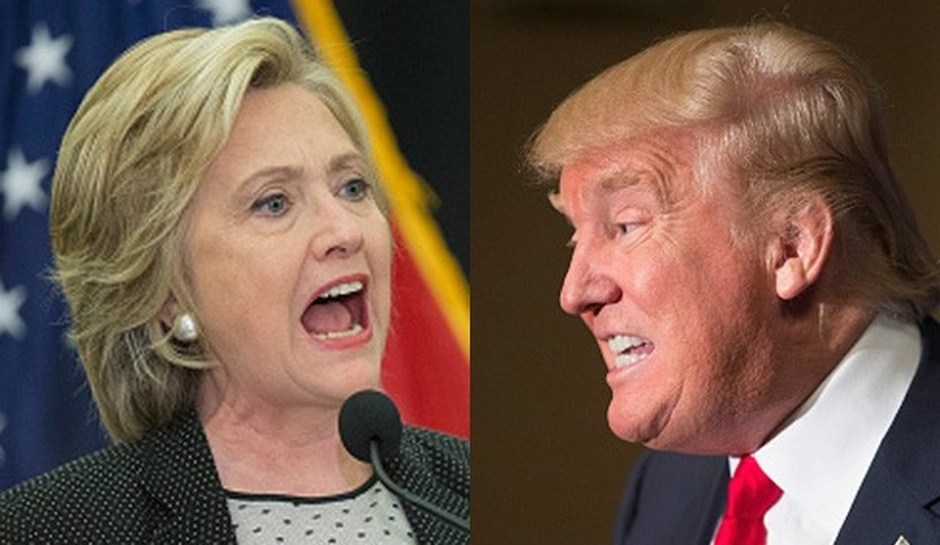
Americans are choosing a new president Tuesday, but not just that. They are making history, reshaping Congress, saying good riddance to a campaign of numbing negativity and setting the political calculus of a nation that won’t be healed any time soon. Whether the glass ceiling shatters or not, precedent will. Never before has the country had a woman as president, not to mention the spouse of an ex-president. Never before has the country had a president like, well, Donald Trump, unique in lacking the public-service background that everyone in our lifetimes and deeper into the past brought to the office (both his weakness and his strength). Whether the 45th president is Hillary Clinton or the billionaire outsider, the U.S. is turning a corner. CLINTON vs. TRUMP The two New Yorkers pounded each other relentlessly, each preaching that the other is wholly unqualified, as the race tightened in the final days after a persistent if elastic lead for Clinton, the Democrat, in preference polling. Those who dreamed of Bernie Sanders for the Democratic ticket or anyone but Trump for Republicans face their time of reckoning. Will they come home to their party, or just stay home? Clinton, inheritor of Barack Obama‘s vaunted campaign apparatus and a skillful (and well-financed) organizer in her own right, fielded an impressive professional and volunteer operation. She had big names on the stage, loads of people tracking down supporters and getting them to early-voting places, committed and well-heeled interest groups behind her and lots of money for sustained advertising. Trump’s effort paled in comparison, seeming as unpolished and improvised as the candidate himself. What he had, that she didn’t, were the pulse and the passion of huge crowds. Election Day should settle the question of which counted for more. To those in Trump country, no boastful, stomach-turning video about women, no “lock-her-up” insult from the stage, no toxic tweet in the wee hours, could peel them away from the man whose crudities only made him more authentic in their eyes. To many of the Republicans who didn’t come to the rallies – and to some of the lawmakers who faced the prospect of working with him in Washington – he was a disaster, a Republican Titanic sailing alongside Clinton’s Democratic Lusitania. To the country at large, and much of the world, he polarized, repelled, entertained, shocked and fascinated. Did that make Clinton less of a divisive figure? Not to the Republicans who are already itching to impeach her if she wins. — WHAT TO WATCH Virginia could be a harbinger for the night. An early win for Clinton in that state bodes well for her; a contest that drags on until 9 p.m. or 10 p.m. EST could mean a good night for Trump. Results begin to come out when polls close at 7 p.m. in Georgia, Indiana, Kentucky, South Carolina, Vermont and Virginia. More waves come just after 8 p.m. and 9 p.m., when polls will have closed in 30 states and the District of Columbia. Trump and Clinton fought fiercely over Florida, a big prize. Trump also made an audacious play for Minnesota and scared Clinton in Michigan, which drew both the Democratic nominee and President Barack Obama on the campaign’s final day. Republicans fretted about Utah, normally as GOP-friendly as can be. The state was courted by an independent who tapped anti-Trump sentiment among the state’s many Mormons. — FIZZLING OCTOBER SURPRISE FBI Director James Comey‘s disclosure that the agency discovered more emails potentially connected to its investigation of Clinton’s email practices roiled the race. That shadow lifted when Comey said Sunday that the review had found nothing to change the FBI’s recommendation in July that she not face charges. Between his two announcements, though, nearly 24 million ballots were cast in early voting. — SENATE SUSPENSE The night’s second big mystery is which party will control the Senate, now Republican dominated. Democrats need to gain five seats to take an outright majority. If they gain only four – and if Clinton is elected – her vice president will be able to break 50-50 Senate ties. Indiana could give an early hint of where the night is going. Nevada, New Hampshire, Pennsylvania, Missouri and North Carolina could tip either way. Republican incumbents were in particular danger in Illinois and probably Wisconsin. The math made it tough for the GOP: Republicans had to defend 24 seats compared with only 10 for the Democrats. Some were between a rock and a hard place – risking rejection from anti-Trump Republican voters if they were too close to him and rejection from his core supporters if they pushed him away. Squirmy rhetoric ensued. — HOUSE HUNTING Barring a shocker, Republicans will keep control of the House. They populate that chamber in numbers not seen since the 1930s. The breakdown is 247-188 for the GOP, with three vacancies. GOP losses of 10-15 seats have been predicted by people in both parties. Notable names: Republican Liz Cheney is expected to win the Wyoming seat once held by her father, Dick Cheney. GOP Rep. Darrell Issa of California, investigator of the Benghazi, Libya, episode and other Obama administration actions, could be upended. — RESUME REVIEW Rare is the U.S. president who has come to office without having held any previous public office. To be sure, some were branded resume lightweights in their campaigns: ex-governors George W. Bush of Texas, Bill Clinton of Arkansas and Ronald Reagan of California, among them. But they came from the tradition of having served somewhere – whether in Congress, states or in a high post in an administration. Dwight D. Eisenhower had no political experience but plenty of leadership cred – as well as war hero status – as allied commander in Europe in World War II. Trump comes purely from the business and reality-TV worlds, making him distinctly a political outsider even if he’s firmly part of the elite. No one questions Clinton’s breadth of experience, as secretary of state, a New York
What’s ahead for Donald Trump? Some clues from the campaign
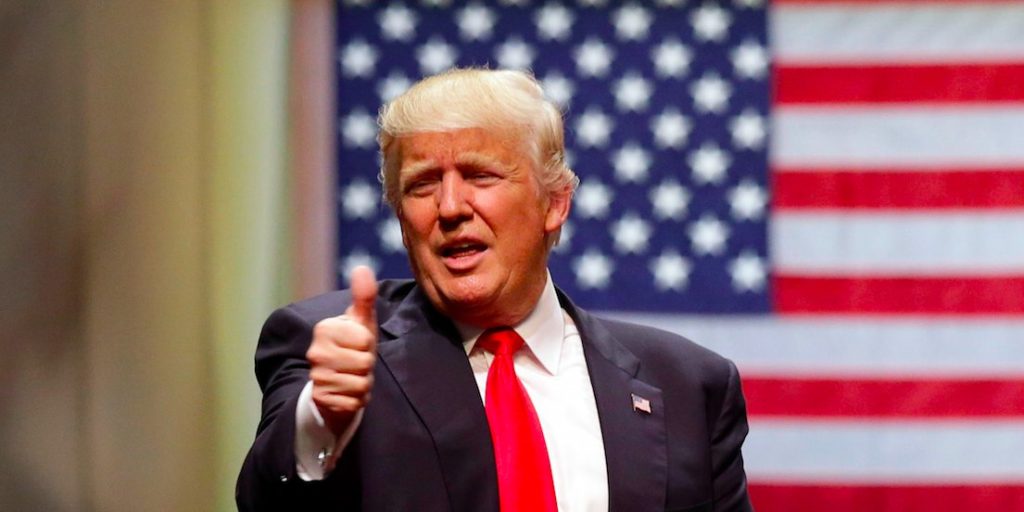
In a campaign for president packed with moments to remember, and more than a few decisions to forget, there are some that will resonate for Hillary Clinton and Donald Trump on Election Day. Here’s a look at five key points in Trump’s race for the White House that offer clues about what will happen as the campaign comes to its conclusion. — IMMIGRATION The Republican National Committee’s “autopsy” of Mitt Romney‘s 2012 loss urged that the GOP reach out to minority voters, in part by passing immigration reform. Trump had other ideas. In the first moments of his candidacy, Trump said that Mexican immigrants were “bringing drugs, they’re bringing crime, they’re rapists, and some, I assume, are good people.” He pledged to build a southern border wall, putting a hard-line immigration policy at the very heart of his campaign. The decision electrified a swath of the Republican base, many of whom felt immigrants had taken their jobs and threatened their position in society, and led to “Build the wall!” chants becoming a staple of his signature rallies. But while the plan helped separate Trump from the crowded Republican primary field, Democrats used it as means to mobilize Latino voters, and early voter turnout among Hispanics surged in battleground states like Nevada and Florida. — POPULIST MESSAGE A billionaire who lives in the penthouse of a Manhattan skyscraper that bears his name is an improbable choice to be a champion of the working-class. But Trump settled on a populist rhetoric, denouncing trade deals that he says have particularly hurt Rust Belt workers and tailoring his message to white-working class voters. That pitch has allowed Trump to play in traditionally Democratic strongholds in the Midwest; most polls have him close in Michigan, Ohio, Iowa and Pennsylvania. And, win or lose, it threatens to reshape his adopted party, potentially splintering the Republican’s working class base from the GOP establishment. — UNCONVENTIONAL CAMPAIGNING During the Republican primaries, Trump boasted that he was self-funding his lean campaign operation. While that was not entirely true, it foreshadowed Trump’s decision to run a small, unorthodox campaign that frequently pitted advisers against each other and he went through three campaign managers. He eventually reluctantly embraced fundraising, and while he proved skillful at collecting small donations, he was left far behind Clinton’s financial behemoth. Moreover, the campaign’s decision to largely outsource its voter outreach efforts to the Republican National Committee, which is not as robust as the joint Clinton-Democrats operation, could leave him at a disadvantage in turning out supporters to the polls. — PICKING FIGHTS Trump emerged from his party’s annual convention in Cleveland in July with a momentum and a- mostly- unified party behind him. But the following week, Khizr Khan took the stage at the Democratic National Convention. Khan praised his soldier son, who was killed in Iraq in 2004, and while waving a copy of the Constitution, denounced Trump’s plan to ban Muslim immigrants from entering the U.S. Trump lashed out, attacking both Khan and his wife – whom he suggested was forbidden from speaking in public due to her religion – in interviews and on Twitter, drawing bipartisan condemnation and opening a fault line with some military families, normally reliable Republicans. He made a similarly reckless decision after the first debate, during which Clinton mentioned a former Ms. Universe, Alicia Machado, who says Trump belittled her appearance. Trump couldn’t resist taking the bait, attacking Machado during a 3 a.m. “tweet storm.” The fight, which contributed to a plunge in the polls, underscored Trump’s difficulties with women and Latino voters. — PROBLEMS WITH WOMEN From the beginning, the reality TV star struggled with winning over women. The thrice-married businessman, whose personal life was fodder for the New York tabloids for decades, had very public, insulting feuds with female celebrities like Rosie O’Donnell and was known for describing women by their appearances, often in unflattering terms. And then things got dramatically worse. Last month, a 2005 video emerged of Trump riding on an “Access Hollywood” bus with then-host Billy Bush while using vulgar terms to describe women and talked about how his fame allowed him to force himself on women. And then in the aftermath of the second presidential debate, nearly a dozen women came forward and accused Trump of kissing or grabbing them without consent. Trump has denied the charges and threatened to sue his accusers – but his poll numbers with women only sank further. Republished with permission of the Associated Press.
What’s ahead for Hillary Clinton? Some clues from the campaign
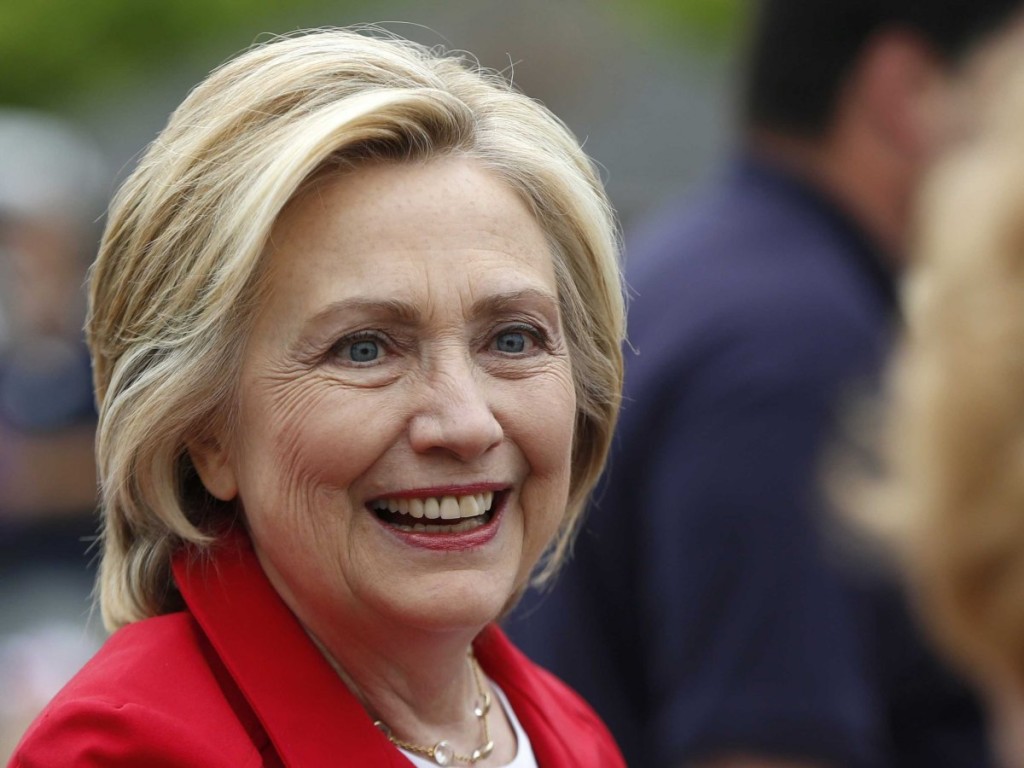
In a campaign for president packed with moments to remember, and more than a few decisions to forget, there are some that will resonate for Hillary Clinton and Donald Trump on Election Day. Here’s a look at five key points in Clinton’s race that offer clues about what will happen as the campaign ends. — EARLY VOTE VALUE It was late on the night of the kickoff Iowa caucuses when Clinton took the stage before supporters in Des Moines and said: “I stand here tonight, breathing a big sigh of relief.” Relief, indeed. Faced with a late surge in momentum for Vermont Sen. Bernie Sanders in a state that has never fully warmed to her, Clinton barely eked out a win in the leadoff event of the 2016 campaign. She beat Sanders by less than three-tenths of 1 percent. While the close finish gave supporters the jitters, it did not upend the race – which a loss to Sanders would have. How did she do it? Clinton invested heavily in a formidable voter targeting and get-out-the-vote effort in Iowa. She spent millions to create a similarly robust voter turnout operation nationwide, with a focus on the country’s battleground states. She and her team were unquestionably confident in the race’s final days, and that turnout machine is perhaps the biggest reason why. — AFRICAN-AMERICAN TURNOUT It took Clinton until June to officially wrap up the Democratic primary against a surprisingly robust challenge from Sanders. But the contest was effectively decided on Super Tuesday when African-American voters gave Clinton a huge advantage. In seven of the Southern states voting that day, Clinton got more than 8 in 10 black votes. Early voting figures ahead of Election Day show black voters are not turning out at the same levels as in 2012, when they helped deliver President Barack Obama a second term. Campaigning for Clinton, Obama appealed directly to African Americans, arguing she would continue his agenda while Trump would overturn it. Speaking to voters in North Carolina recently, Obama did not temper his anxiety: “The fate of the Republic rests on your shoulders.” — LATINO VOTE It was a tender moment for Clinton. At a meeting with Latino activists in Las Vegas in February, a young girl told her about her fears her parents would be deported. Hugging the child, Clinton said: “Let me do the worrying.” Her campaign quickly turned the moment into an emotional campaign ad. Clinton has never stepped back from backing an immigration system overhaul, including plans to create a pathway to full citizenship for people living in the country illegally. It was among her most stark contrasts with Trump. Democrats have been encouraged by a strong early vote turnout from Latinos in Florida and Nevada, and Clinton’s embrace of the issue could help make Latinos a key part of a potential winning coalition. — MILLENNIAL MOMENTUM A single night in New York City days before the state’s primary laid bare the difference between Clinton and Sanders. Sanders, the self-described democratic socialist, held an event in Manhattan’s Washington Square Park that his campaign said drew 27,000 people. At the same time, Clinton rallied about 1,300 supporters at a community center in the Bronx. While Clinton went on to decisively win the primary, the contrasting crowd sizes exposed a weakness – her difficulty in exciting young voters. They flocked to Sanders’ more liberal message, which included moving the country onto a single-payer health care system and free tuition at public universities. Since she became the nominee, Clinton has aggressively wooed millennials, visiting millennial-owned businesses and campaigning with celebrities. — THOSE DAMN EMAILS Before she even officially declared her candidacy for president, Clinton had to step before reporters to try and explain why she’d used a private email server while serving as secretary of state. It took Clinton months to come to terms with how damaging the email issue had become to her candidacy. In the race’s final moment, FBI said it had found new emails on the laptop of disgraced former congressman Anthony Weiner, the estranged husband of top Clinton aide Huma Abedin. Nine days later, and just two days before Election Day, the FBI said it hadn’t found anything worth looking at. But it was one final email mess, and should Clinton lose, many will point to her decision to use the private email system as the reason so many voters distrusted her and turned to Trump. Republished with permission of the Associated Press.
Making a choice: Voters talk of decision and of tensions
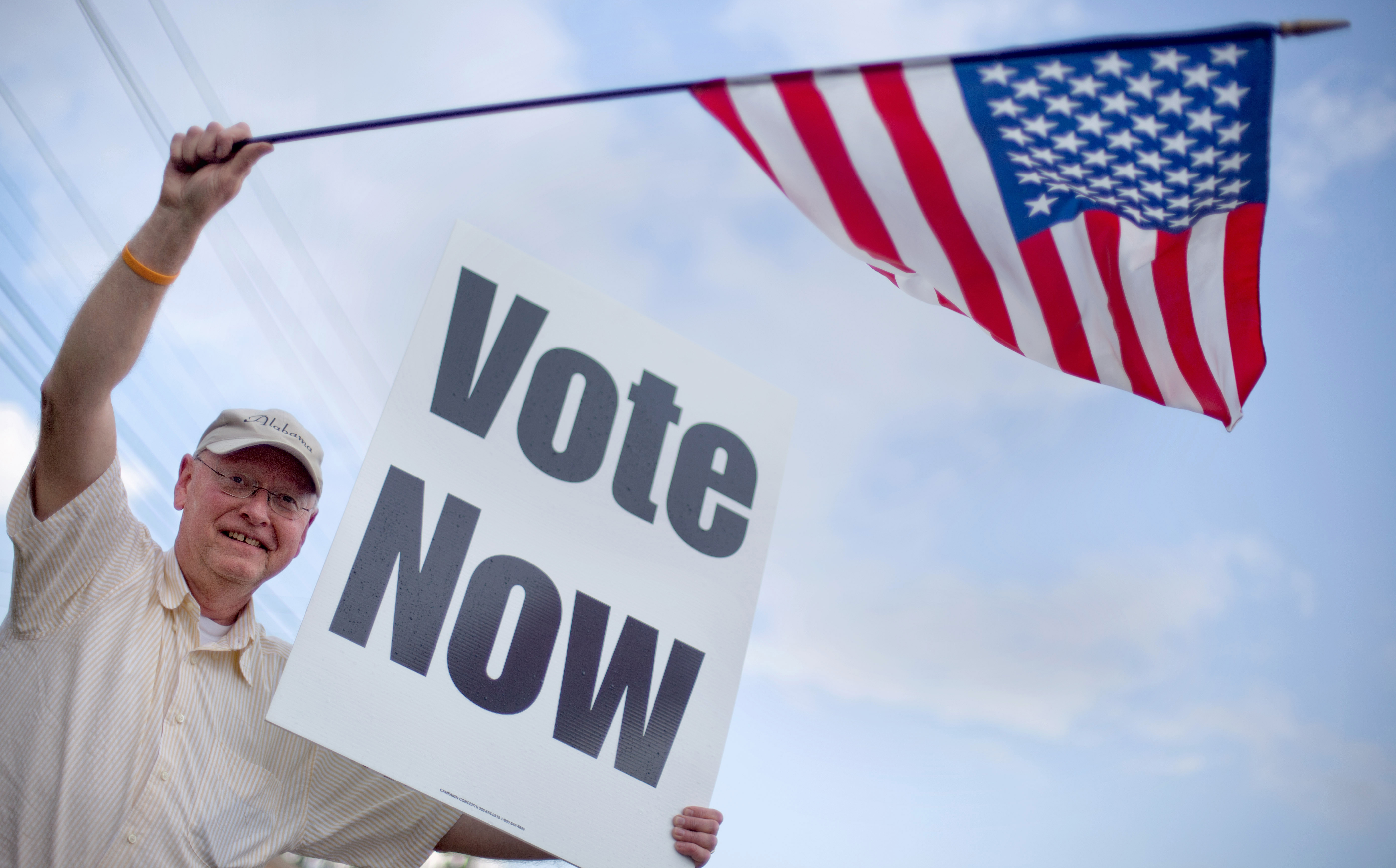
Election Day has arrived at last, and Americans are heading to the polls to have their say in the choice of the next president. Some paused to talk about their decisions and the tensions of the moment. — Thomas Tillotson and Russ Van Deursen differed when they voted for president early Tuesday in Dixville Notch, New Hampshire, one of the first polling sites to open in the nation. But they were in solid agreement on one thing. “It’s very exciting to be the first in the nation,” said Van Deursen.”Your vote is right out there in the small little hamlet that we have of seven or eight voters and it feels like you’re a real part of democracy.” He voted for Democrat Hillary Clinton because “our country needs to move forward and I didn’t believe that a presidency with (Republican) Donald Trump would move forward in a positive way.” Polls in the town opened just after midnight closed as soon as everyone had voted. “It’s an honor and privilege to be first and this is my 11th time doing it and it never gets boring,” said Tillotson, a 71-year-old business consultant who voted for Libertarian Gary Johnson. He said both major parties have “gone in directions that really don’t fit who I am and what I believe.” — When Art Meadowcroft exited city hall in Plymouth, Minnesota, Monday after casting an early ballot, he reached into his pocket for a camouflage cap bearing Donald Trump’s slogan, “Make America Great Again,” and placed it on his head. “It was a tough decision because he certainly had his very rough sides,” Meadowcroft, 62, said of Trump, his choice for president. “But I don’t think there is a question mark when it comes down to what is in his heart and what he wants for the country.” Meadowcroft, a former college administrator, coach and real estate agent who is now retired, came to vote with his sister, bringing sandwiches to pass the time in a long line. A self-described independent, he said he’d voted in the past for Democrats, including once for Bill Clinton. But he voted for Trump because it is time to get back to the “true values” of the country. Meadowcroft said he believes firmly in immigration. But he wants better vetting to ensure “the right people are coming in, people that want to grasp our values… I think we’ve opened the doors too much, and made ourselves vulnerable.” — This election marks the first time that sisters Yadira and Catherine Jimenez have voted. They cast early ballots in West Jordan, Utah, and had no hesitation about their choice. Both voted for Hillary Clinton. For Yadira, whose husband has lived in the U.S. since he was a toddler but is not a citizen, the vote was partly a reaction to Donald Trump’s hard line on immigration. But the sisters, both young mothers and pregnant, said they also wanted to signal their approval of a woman as the country’s leader. “I thought it would be nice to be alive to see the first lady president,” said Yadira Jimenez, 24, who works the front desk at a pediatrician’s office and is expecting her first daughter. “It shows you can achieve anything in life and that not just men are capable of becoming president. I want to show my children that anybody can do anything as long as they work hard.” She and her sister said it was important that the winning candidate be someone who cares about people like them. But Trump is definitely not that person, they said. “He’s racist not only to Latinos, but to pretty much every race,” said Catherine Jimenez, who is 20 and studying to be a medical assistant. — Hallie Luckianow says she considered voting for either Hillary Clinton or Donald Trump. With a father who works in an oil industry hit by sagging prices, she was drawn to Trump’s America-first policy on energy. As a lesbian, she says she likes Clinton’s vocal support for gay rights. But Luckianow, taking a lunch break Monday in a Birmingham, Alabama park, said in the end she cast her vote for what she sees as a centrist choice. “I’m kind of pulled in both directions and that’s why I’m going to Gary Johnson. Because this entire election has been crazy,” said Luckianow, 27, a speech therapist. Luckianow said she liked the notion of electing the nation’s first female president. But she figures that time will come soon enough, even if Clinton loses. “I think it would be really empowering for women and empowering for little girls to see that someone other than a white male or a black male could be president,” Luckianow said. Republished with permission of the Associated Press.
As campaign closes, the Obamas pass the torch to Hillary Clinton
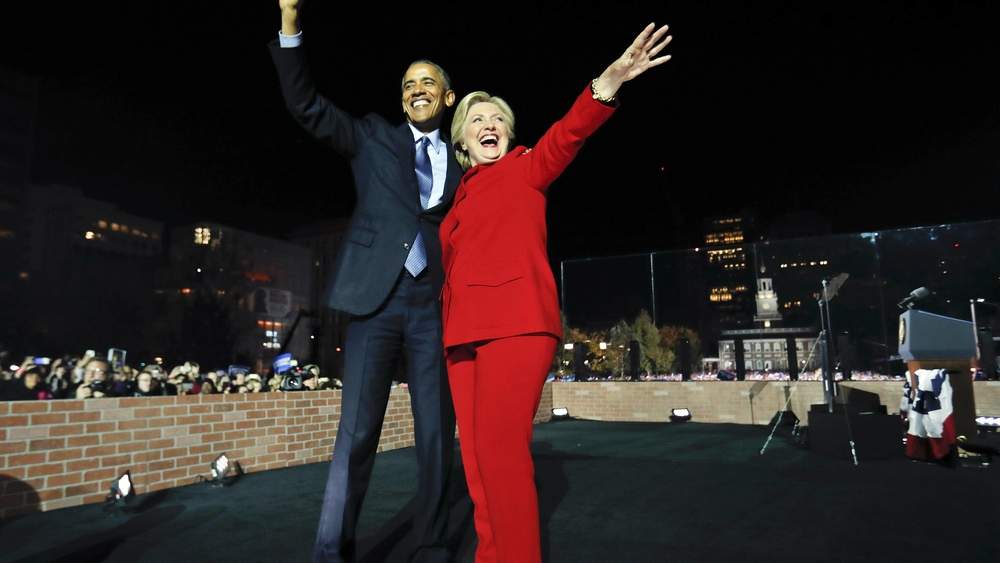
In the place where America’s democracy took root, with tens of thousands shivering in the cold, Barack and Michelle Obama passed the torch to Hillary Clinton in an emotional but anxious plea to elect her president. Though the book won’t close on his presidency until Inauguration Day, Obama’s frenzied, last-minute push for Clinton was a farewell tour of the nation. As he crisscrossed Michigan, New Hampshire and Pennsylvania Monday, he waxed nostalgic, told old stories and teared up as he thanked the nation for betting, improbably, on “a skinny guy with a funny name.” He said he’d been asked recently whether the hope that defined his campaign had somehow survived eight trying years. “The answer’s yes,” Obama said in Independence Mall, not far from the Liberty Bell. He said he was still a believer, “and that’s because of you.” “In the letters you’ve written me, in the tears you’ve shed for a lost loved one, I’ve seen again and again your goodness and your strength and your heart,” Obama said. Then the Obamas and the Clintons embraced onstage: The last Democratic president and the current one; the first black president and the woman who, on Tuesday, may break yet another historic barrier. It was left to Michelle Obama, whose visceral speeches this campaign hit a nerve with many Americans, to cast both families as part of a singular American story: One of inclusive opportunity that she hoped would contrast powerfully with the vision of Republican Donald Trump. She said she marveled at a country where “a girl like me from the South Side of Chicago, whose great-great-grandfather was a slave, can go to some of the finest universities on earth. Where the biracial son of a single mother from Hawaii and the son of a single mother from Hope, Arkansas, can both make it to the White House.” “Thank you for welcoming us into your communities, for giving us a chance whether you agreed with our politics or not,” Mrs. Obama said, in her own send-off to the nation. She said ensuring Clinton wins the election was “perhaps the last and most important thing that I can do for my country as first lady.” It wasn’t always this way. In 2008, when Obama defeated Clinton in a grinding primary, there was naked bitterness between the two Democrats that only began to soften when Obama named her secretary of state. Nearly a decade later, the Obamas need Clinton as much as she needs them, to prevent their legacy from being eviscerated by a victorious Trump. After all, the president told supporters earlier in Ann Arbor, Michigan, all his accomplishments “go out the window if we don’t win tomorrow.” Clinton, too, was meditative about the bruising battles that have led her to this moment. “I regret deeply how angry the tone of the campaign became,” Clinton said, without naming Trump. In a less-than-subtle display of political symbolism, she spoke from behind the presidential seal affixed to the podium from which Obama introduced her. The Obamas are keenly aware that whether or not Clinton wins Tuesday, their era is coming to an end, a reality punctuated by both Obamas’ insistence that neither will ever run for office again. So in a parting gift to Clinton, Obama offered her his campaign mantra – “Fired up, ready to go” – and told rally-goers in New Hampshire how it had been coined by a supporter he’d never met who showed up at an obscure event eight years ago in South Carolina. “It just goes to show you how one voice can change a room,” Obama said – and then a city, a state and a nation. “And if it can change a nation, it can change the world.” Republished with permission of the Associated Press.
New Hampshire delivers the very first Election Day results (Donald Trump took the lead)
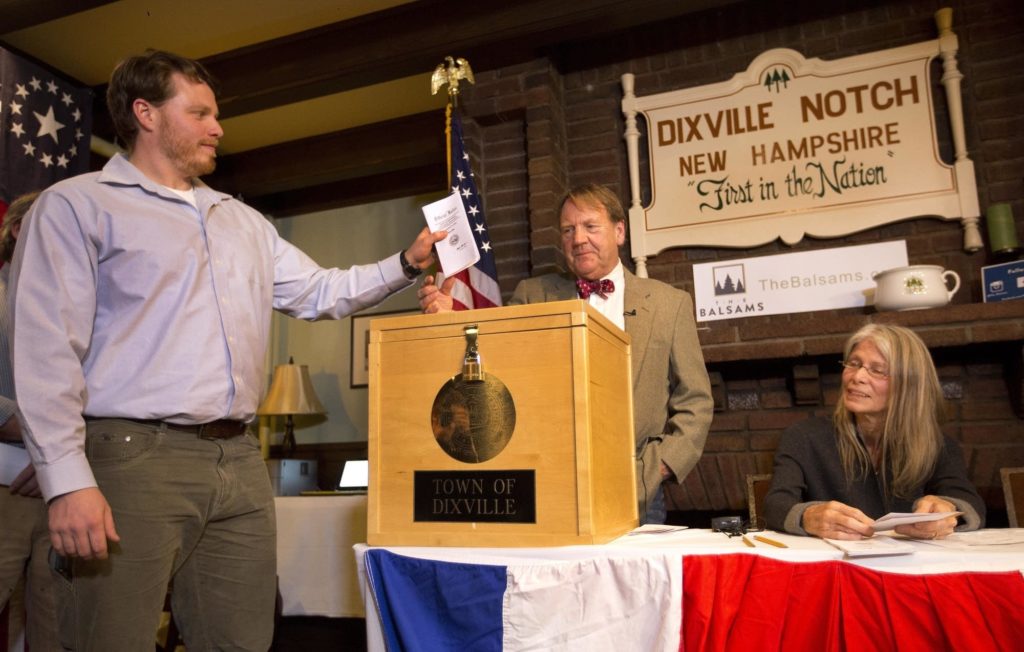
Donald Trump is off to a very early lead in the 2016 presidential election, winning over the voters of three New Hampshire precincts by a 32-25 margin over Hillary Clinton. Polls in the tiny New Hampshire towns of Dixville, Hart’s Location and Millsfield opened just after midnight Tuesday and closed as soon as everyone had voted. These die-hard voters are proud to have the first word on the big vote. Clinton won more votes in Dixville and Hart’s Location, but Trump was the overwhelming favorite in Millsfield, with a 16-4 edge. Libertarian Gary Johnson picked up three votes. Bernie Sanders, John Kasich and 2012 Republican presidential nominee Mitt Romney got write-in votes. Under New Hampshire state law, communities with fewer than 100 voters can get permission to open their polls at midnight and close them as soon as all registered voters have cast their ballots. Republished with permission of the Associated Press.


